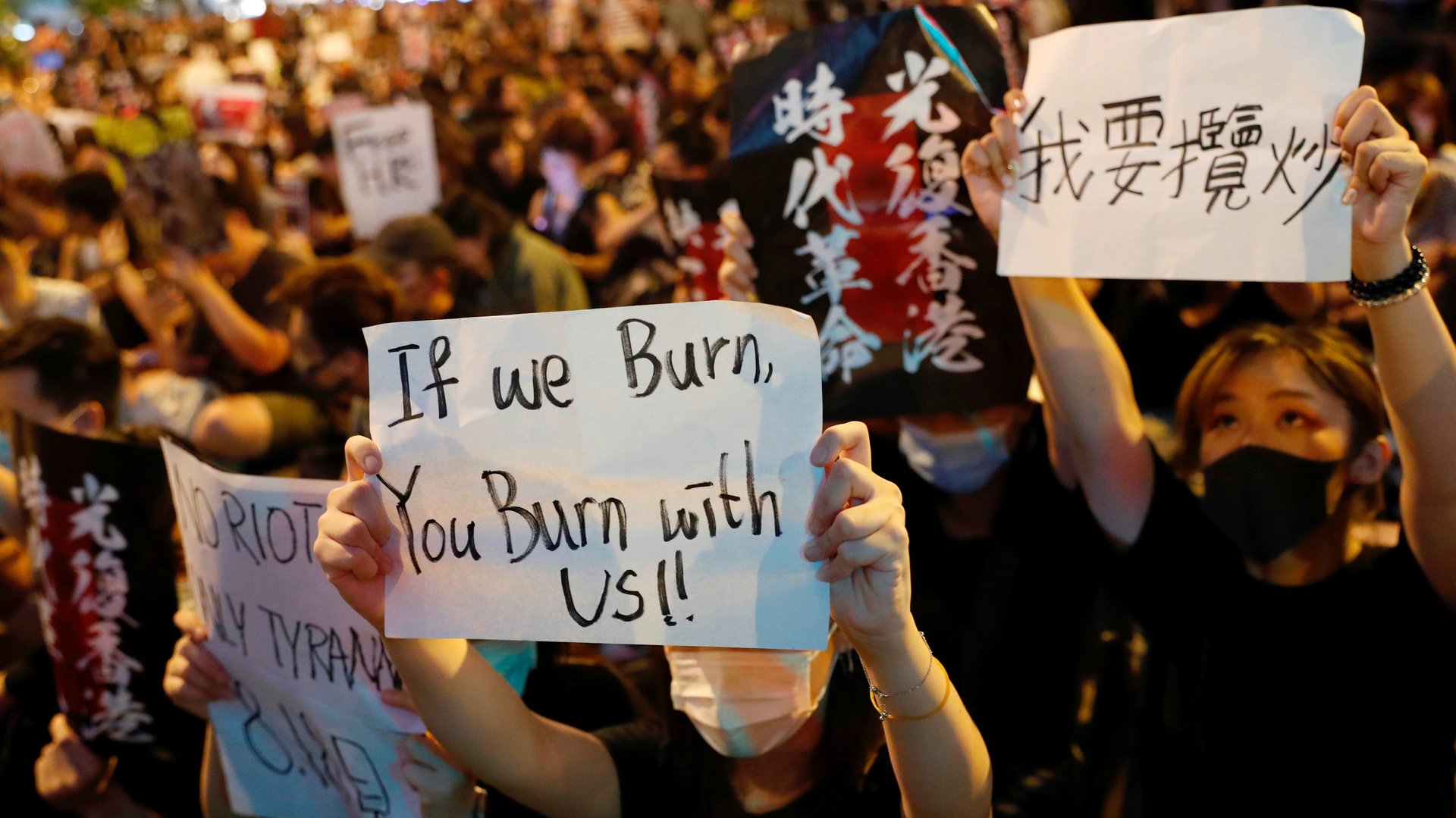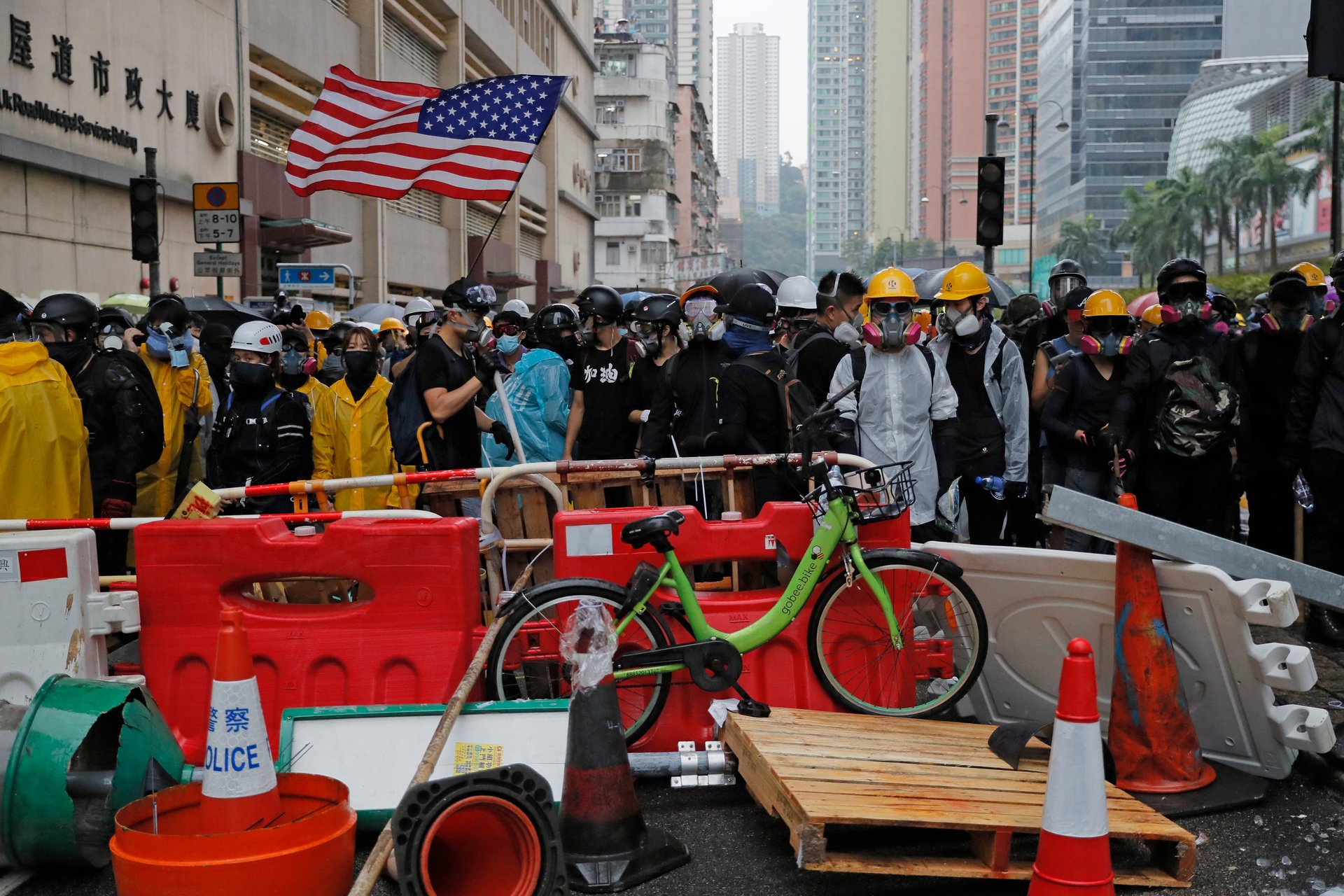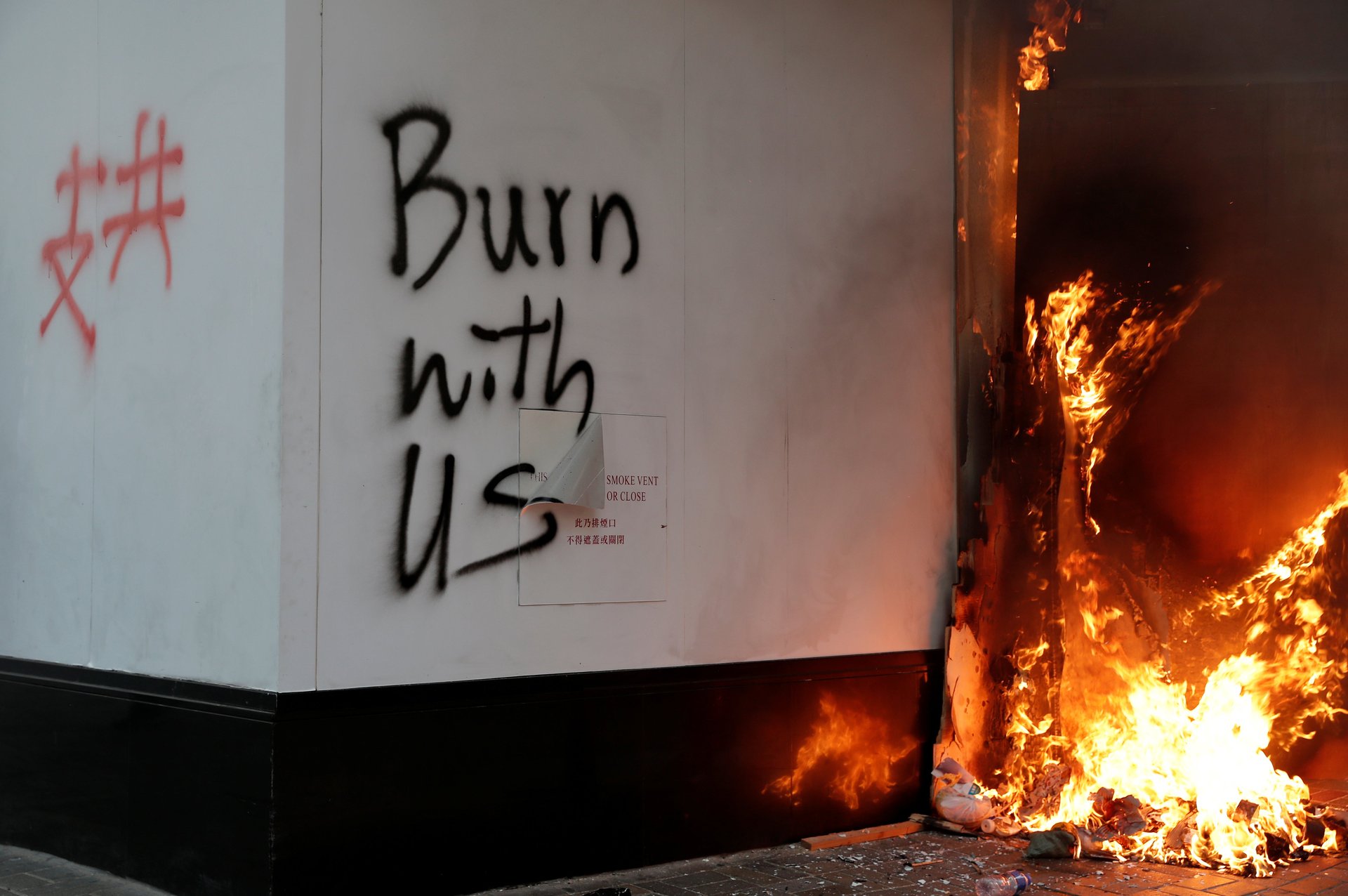“Laam Caau:” The high-stakes game that Hong Kong protesters are waging with China
In the original telling of David versus Goliath, the smaller David unexpectedly defeats his giant foe with several well-aimed pebble shots to the head. But let’s imagine a different kind of showdown: one in which the underdog, aware of the impossible odds, grips on to the opponent as they wrestle to the death, eventually tumbling off a cliff and crashing down in mutual destruction.


In the original telling of David versus Goliath, the smaller David unexpectedly defeats his giant foe with several well-aimed pebble shots to the head. But let’s imagine a different kind of showdown: one in which the underdog, aware of the impossible odds, grips on to the opponent as they wrestle to the death, eventually tumbling off a cliff and crashing down in mutual destruction.
That’s laam caau (攬炒, pronounced “lahm tsow”), the strategy that a sizable fraction of Hong Kong protesters think is the only way they stand a fighting chance against their formidable authoritarian foe, the Chinese Communist Party (CCP). The phrase, which literally translates to “embrace and fry” in Cantonese, is borrowed from poker to mean making your opponent suffer as much as you do. Some call it a scorched earth, or an “if we burn, you burn with us” philosophy. At its core, it’s the belief that the existing political framework is so rigged that operating under the current rules of engagement, as dictated by China, will only lead to defeat.
“Essentially, laam caau is our way to strike back at the Chinese Communist Party,” said a protester who asked to be identified as Finn, and who is widely known for writing under the username “I want to laam caau” on the popular protester online forum, LIHKG. Finn adds that laam caau is “a bargaining move for Hong Kong against a major power in the world… if we are not allowed to be autonomous, we will use our own leverage to bring CCP down with us.”
Laam caau entails pursuing action in different spheres of influence, as Finn defined it in a video manifesto (link in Chinese): street protests, the local legislature, and international diplomatic outreach. It can also mean favoring small pro-democracy businesses—the “yellow economic circle”—instead of chains owned by pro-Beijing tycoons. Each component reinforces the other, and only by combining battle lines can Hong Kong “leverage [its] unique position as a special city against the CCP.”
The high-stakes strategy is now being put to the test as China makes its most aggressive move yet—exerting direct control over Hong Kong by imposing a sweeping national security law that will criminalize a vast and vague set of acts.
Geopolitical brinksmanship
After tolerating last year’s large-scale protests without sending in troops as many had feared—and some laam caau proponents had hoped—Beijing took advantage of the world’s distraction with the pandemic to move swiftly to dismantle Hong Kong’s remaining freedoms. In a culmination of those steps, China’s top legislature today passed a national security law, entirely bypassing the territory’s own legislative procedures. It comes into effect (pdf) just in time for the anniversary of the territory’s handover from Britain to China—and protests are expected even though the city’s annual July 1 democracy march has been banned.
Right up to its passing the Hong Kong government had barely seen the law’s full text, let alone anyone else, but leaked details of the legislation suggested that Chinese security agents would be allowed to operate in the city for the first time; suspects could be held indefinitely in special detention facilities; and those convicted could face life imprisonment. (Update: The text of the law (pdf) was finally published only when it took effect at 11pm local time, June 30; China Law Translate has an unofficial English translation and here’s a thread on its alarming provisions.)
The law is set to change Hong Kong in exactly the way the protesters have feared—yet many of them almost welcome it, willing China to intensify its crackdown in hopes of triggering international punishment. That same desire spurred many protesters last year to adopt increasingly confrontational and at times violent tactics, such as throwing molotov cocktails and vandalizing China-friendly businesses. Last year, on July 1, they stormed the city’s legislature. They also lobbied governments worldwide, from running a massive global ad campaign ahead of the G20 summit, to waving US flags during street protests, and meeting with US politicians to make the case for sanctioning Beijing.

China appears to be defiantly pressing ahead, wagering that it will call the world’s bluff on Hong Kong. The chips are down, and the question now is where they will fall. That question is somewhat moot for laam caau protesters supporters: they want to see the card table overturned entirely. That ultimately means redrawing Hong Kong’s relations with the world, because protesters see Beijing using Hong Kong to power its own global economic ambitions while systematically eroding the territory’s freedoms.
“It’s a gamble,” said Ho-fung Hung, professor of political economy at Johns Hopkins University. “In the end, they might not gain anything and lose something more, even if they think they have nothing to lose anyway.” Still, he said, last year’s protests merely accelerated China’s move to take full control of the city. “The choice is between dying quietly without the world noticing, or dying with dignity with the world noticing, and at the same time creating the chance of causing some damage to the people who kill Hong Kong.”
A major victory for the laam caau-supporting protesters came when the US said it would begin to revoke the city’s special trade status, which will have unpredictable—but definitely painful—consequences for both Hong Kong and China. Two-thirds of all foreign direct investment in China is channelled through Hong Kong, according to national statistics, and the city is a big depository of assets. Disrupting such a massive financing conduit risks destabilizing an already-slowing Chinese economy. Meanwhile, Washington has moved to impose sanctions on Chinese officials, threatened to sanction banks, and halted exports of defense and sensitive technologies to Hong Kong.

For the laam caau camp, this upheaval in Hong Kong’s global position, despite its cost, is better than more “inaction,” as Finn describes the decades when Hong Kong’s pro-democracy moderates engaged with Beijing under the “one country, two systems” framework. Under it, Beijing promised to preserve the territory’s freedoms, and also demanded patience in exchange for eventually granting the democratic right to choose the territory’s leader—which never came.
“We have already wasted decades bargaining for our promised freedoms,” said Finn. “Once you realize that there is no way back and the veneer of freedom in the past has peeled off, then taking action is the only real answer.”
Burning for a lifeline
The laam caau strategy has divided Hong Kong’s pro-democracy camp.
The older, more moderate faction, see it as a recklessly naïve approach that will bring no gains—and could even cause losses come the September legislative elections, undoing the opposition’s landslide victory in November’s local district elections. While polling (pdf) by the Chinese University of Hong Kong showed that as of December, 97.5% of respondents agreed with the use of radical protest tactics by protesters, as the protests have dragged on, recent polling has also shown a dip in support.
Instead, the moderates urge Hong Kongers to try and preserve their existing freedoms. In an interview with the New York Times, Martin Lee, the founder of Hong Kong’s first pro-democracy party who was arrested this year, put it this way: “If you start the revolution, and then you’re completely defeated, many people will die with you. So how does that help Hong Kong?”
Laam caau supporters disagree. A protester in his 20s, who declined to be named, said he would have preferred not to have to subscribe to laam caau—which he called “a last breath before death”—if there were alternatives.
“Under the current system, Hong Kong will only become more like China,” he said. “And when a regime is totalitarian, who suffers is the people. The regime never suffers.”
The laam caau faction may well win moderates over in time. Hung, the professor, pointed to legal scholar Benny Tai, one of the key masterminds of the peaceful occupation of roads during the 2014 Umbrella Movement, as a moderate figure who has since embraced the doctrine of mutual destruction. In an essay last month, he wrote (link in Chinese): “Even if moderates in the past have expressed doubts over laam caau, now there is no choice: Hong Kong has already jumped off the cliff.”
Claudia Mo, a pro-democracy lawmaker, is another moderate who said she is increasingly “tilting towards” laam caau—and China’s continued efforts to dismiss all protesters as violent extremists will only draw more Hong Kongers in the same direction, she added.
Hong Kong’s protesters know they face a steep uphill fight. But against formidable odds and limited options, laam caau holds out some degree of hope.
“Laam caau is not burning for burning’s sake,” said Finn. “Laam caau is about wrecking the old to build the new, and throwing Hong Kong a lifeline.”